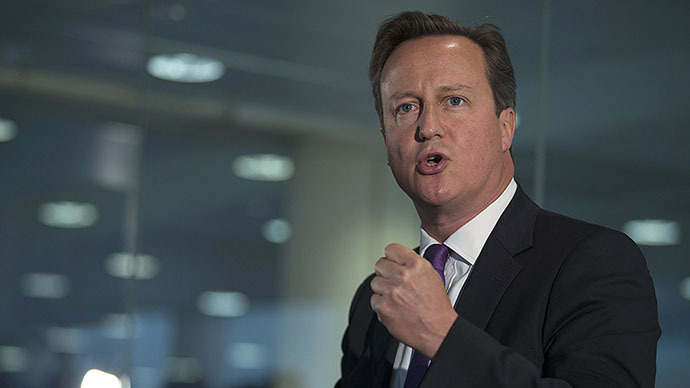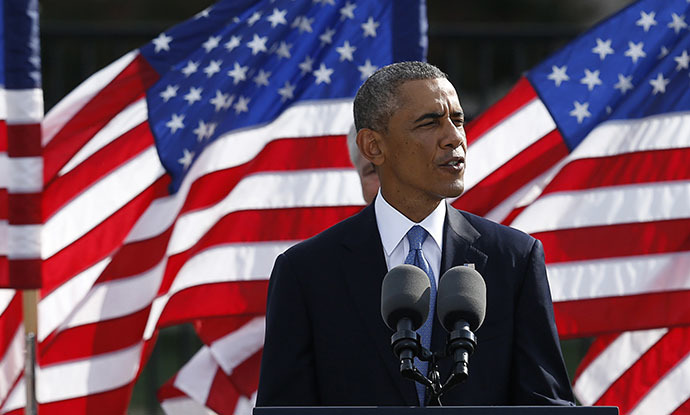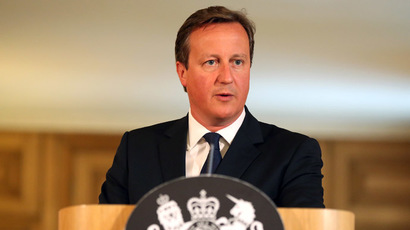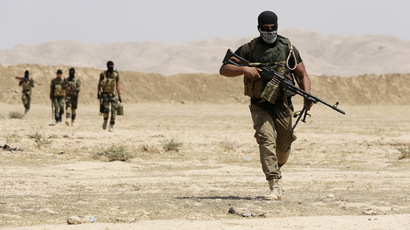Britain has not ruled out airstrikes in Syria – Downing Street

Prime Minister David Cameron is supportive of President Obama’s decision to authorize US airstrikes against Islamic State (IS) militants in Syria, Downing Street has confirmed.
While UK government officials claim there are currently no plans for Britain to engage in airstrikes in Syria, such military action has not been ruled out in the future.
In a televised speech, Obama announced on Thursday he would head a coalition “to destroy Islamic State.” Outlining his strategic plan to tackle IS militants, he said the terror group would find “no safe haven.” According to the American president, US airstrikes will not be limited to Syria alone. US forces may also strike targets in Iraq, he emphasized, in an effort to "hunt down terrorists who threaten our country wherever they are."
A total of 475 US military personnel will be deployed in Iraq to assist the besieged state’s security forces. Obama has stressed, however, that they will not be engaged in a combative role. As IS aggression continues in Syria, the US president has called for Congress to back a plan to train and arm Syrian rebel factions fighting against Islamic State militants in the region.
In response to Obama’s announcement, Putin’s government warned such military action in the absence of a UN Security Council mandate would amount to a “gross violation of international law.”
An official spokesman for David Cameron has confirmed the government’s support for Obama’s military strategy to challenge IS’ stronghold in Iraq and Syria. Reflecting on Britain’s future military involvement with US forces fighting against IS militants, he said Britain will work with the US and “other regional partners on the ground.”
“As to what each country together, how they work in complement with each other, those are decisions for further down the line but I think you will continue to see unity of approach,” he added.

No. 10 said it is crucial to build a network of support in the Middle East, highlighting serious risks associated with antagonizing or “going over the heads” of regional leaders based there.
The Prime Minister’s spokesman emphasized Britain is very much integrated into a “broad” military strategy to tackle IS, which is not merely an American plan but one that was widely “shared at last week's (NATO) summit.”
Regarding the UK’s contribution, the spokesman said Britain’s military “has already been involved and we have supported the approach that the US has been taking and we are going to act, in terms of this long-term approach, in close concert with them.”
Meanwhile, Cameron chaired a meeting of the Government’s extremism task force on Thursday, set up in the aftermath of UK soldier Lee Rigby’s brutal murder in 2013. The special group had previously raised proposals for introducing new orders relating to terror and extremism to empower civil authorities to take direct action against UK residents seeking to radicalize others. This morning's meeting reportedly focused on further realizing these objectives.
A number of British MPs have voiced concerns about UK military intervention in Syria, where years of brutal civil war have allowed IS militants to secure a stronghold in the crisis-ridden state. They fear such military action could be construed as tacit support for Syrian president Bashar Assad’s authoritarian government.
Former British defense chief, Lord Richards, however, recently said the UK should work with Assad, Moscow and Iranian authorities to defeat IS.
His statement followed a previous call from Sir Malcolm Rifkind, who urged the UK government to collaborate with Damascus to defeat jihadist militants in Syria and Iraq.














